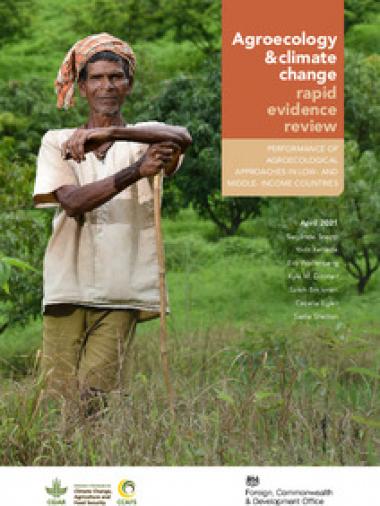- the UK—as part of its COP26 Presidency—engaged a new campaign ‘Transforming Agricultural Innovation for People, Nature and Climate’ to catalyse a step change in agricultural innovation.
- This component of the COP26 Nature Campaign is co-chaired by the UK Foreign, Commonwealth & Development Office (FCDO) and the CGIAR Research Program on Climate Change, Agriculture and Food Security (CCAFS).
- This session is part of a Transforming agricultural innovation - webinar series of 5 webinars
This session reviewed the current evidence for the links between biodiversity and agriculture. It is possible to achieve food and nutrition security while retaining biodiversity within planetary boundaries. This can be done via a diversified agricultural system that also contributes to climate and hydrological security. However, this requires a significant transformation in how we produce food, which depends on a rethinking and recentering of biodiversity as part of our food systems.
- Howard Standen, Climate Change and Food Security Advisor, UK Foreign, Commonwealth and Development Office (FCDO) - Summary of the previous webinar(s)
- Cristina Rumbaitis del Rio, Senior Adaptation and Resilience Advisor, World Resources Institute (WRI)
- Dr. Fabrice De Clerck, Director of Science, EAT Foundation - Current evidence for biodiversity and agriculture to achieve and bridging gaps in research and investment to reach multiple global goals.
"Biodiversity is not jeopardizing the yields"
Panel reacting to evidence review
- Moderator: Cristina Rumbaitis del Rio, Senior Adaptation and Resilience Advisor, World Resources Institute (WRI)
- Ajay Jakhar, Chairman, Bharat Krishak Samaj, India
- Sue Pritchard, Chief Executive, Food, Farming and Countryside Commission, UK
- Florence Jeantet, Managing Director, One Planet Business for Biodiversity (OP2B)
Snapp S, Kebede Y, Wollenberg E, Dittmer KM, Brickman S, Egler C, Shelton S. 2021. Agroecology and climate change rapid evidence review: Performance of agroecological approaches in low- and middle- income countries. Wageningen, the Netherlands: CGIAR Research Program on Climate Change, Agriculture and Food Security (CCAFS). 64 pp.
Agroecology is increasingly seen as being able, or even necessary, to transform food systems (HLPE 2019). The Foreign, Commonwealth and Development Office (FCDO) and the CGIAR Research Programme on Climate Change, Agriculture and Food Security (CCAFS) commissioned this rapid evidence-based review to assess the quality and strength of evidence regarding (i) the impact of agroecological approaches on climate change mitigation and adaptation in low- and middle-income countries (LMICs) and (ii) the programming approaches and conditions supporting large-scale transitions to agroecology and transitions.


No comments:
Post a Comment